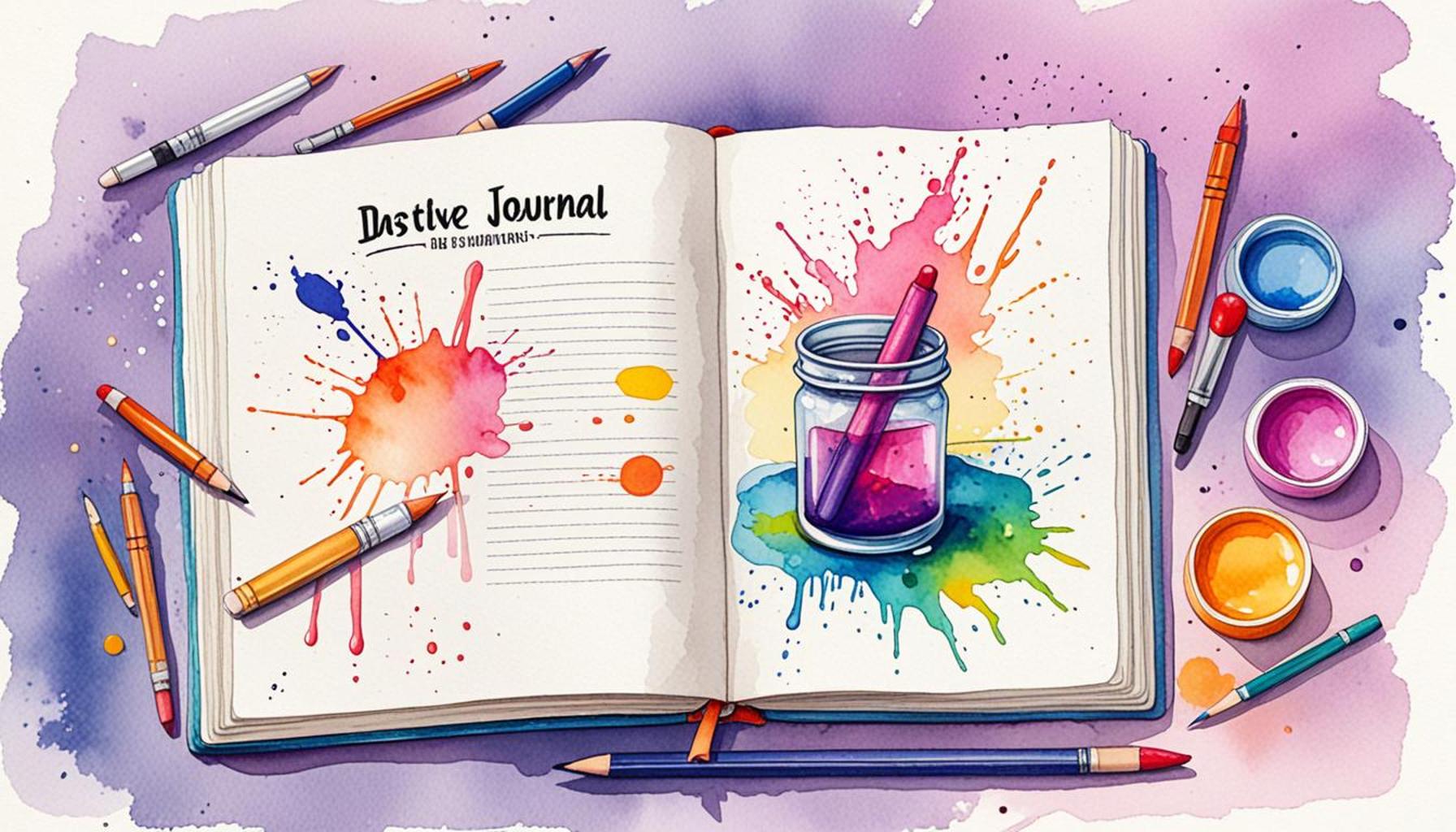Reflective Diary: Building Emotional Connections for Deep Learning

Diving into the Power of Reflective Practice
The intricate relationship between learning and emotions is pivotal in shaping how effectively we absorb and retain information. By creating profound emotional connections to their studies, learners can facilitate deeper understanding and long-term memory retention. A reflective diary stands out as an essential instrument in this transformative process, allowing individuals to capture their thoughts, feelings, and insights alongside their academic pursuits. This practice not only enhances personal growth but also enriches the overall educational experience.
Benefits of a Reflective Diary
Utilizing a reflective diary can significantly enhance the learning journey in several impactful ways:
- Self-awareness: This practice encourages students to delve into their personal beliefs, motivations, and experiences. For instance, a student from a rural community may reflect on how their background influences their academic aspirations and choices, leading to a richer educational experience.
- Emotional expression: Reflective diaries offer a private space for learners to articulate their feelings concerning both accomplishments and obstacles. This practice can help students process emotions related to examination stress, group projects, or the thrill of mastering a challenging subject, providing mental clarity.
- Critical thinking: By prompting deeper analysis of their learning outcomes and decision-making processes, diaries foster a culture of inquiry. For example, when faced with a poor exam result, students can analyze their study methods and emotional state at the time, leading to more informed strategies for improvement.
The Nigerian Context
In Nigeria’s vibrant and varied educational landscape, the integration of reflective diaries into learning could unlock profound transformations. Students can merge their unique cultural experiences with academic learning, creating a deeply resonant understanding that extends far beyond the traditional classroom. For instance, a Lagos student may navigate discussions about environmental issues by intertwining personal narratives about local communities affected by flooding, thus bridging theory with real-life implications.
Additionally, implementing reflective diaries can foster a sense of community among students. In a collaborative learning atmosphere, emotional connections bloom, allowing for richer interactions amongst peers. Sharing reflections can lead to collective support, where students rally around shared challenges and triumphs, reinforcing their educational journeys.
Fostering Empathy and Engagement
The act of documenting personal experiences goes beyond mere reflection; it nurtures empathy and understanding among learners. As students write about their feelings and experiences, they become more attuned to the emotional landscapes of their peers, facilitating stronger bonds and collaborative learning. This shared emotional journey can be especially impactful in diverse classrooms where students come from various backgrounds, promoting respect and appreciation for one another’s experiences.
As we explore the depths of reflective diaries, we uncover abundant opportunities to strengthen emotional ties within learning environments. The potential for these diaries to enrich education in Nigeria is immense, encouraging students to become more self-aware, engaged, and empathetic individuals. Ultimately, reflective practice is not just an academic tool; it is a pathway towards holistic personal and communal growth, making education a truly transformative experience.
SEE ALSO: Click here to read another article
Connecting Through Reflection: The Emotional Framework of Learning
The incorporation of a reflective diary in the educational landscape of Nigeria serves as a powerful catalyst for building emotional connections that can enhance deep learning. By engaging in reflective writing, students cultivate a profound understanding of their emotions and how these emotions intersect with their academic experiences. This dynamic process allows learners to harness their feelings to facilitate understanding and retention of complex concepts, thereby enriching their educational journey.
The Mechanics of Emotional Connection
Students, particularly in the Nigerian context, often grapple with a myriad of emotional challenges that can impact their learning. Reflective diaries provide a structured framework for students to articulate these feelings, thereby converting emotional energy into learning capital. Here are some ways in which reflective diaries can encourage these connections:
- Personal Relevance: Every student’s academic journey is unique; a reflective diary highlights this individuality by allowing them to connect theoretical concepts with personal experiences. For instance, a student studying literature may draw parallels between characters in a novel and real-life events they have witnessed in their community, thus fostering a deeper, more resonant understanding of the material.
- Processing Challenges: In a diverse classroom setting, students often face challenges such as financial constraints, family pressures, or societal expectations that can weigh heavily on their minds. Documenting these struggles in a reflective diary gives students a mode of expression that aids in processing their emotions, reducing anxiety and increasing focus on their studies.
- Motivation and Inspiration: Reflective writing can serve as a source of motivation. By regularly reviewing past entries, students can see their growth over time, reinforcing their commitment to academic success. For example, a student might reflect on a proud moment of overcoming a tough exam, sparking renewed determination to tackle future challenges.
Embracing Diversity in Narratives
The diversity of Nigeria’s student population brings rich narratives that can enhance the reflective diary practice. As students from varying ethnic, cultural, and socio-economic backgrounds share their reflections, it creates a tapestry of experiences that benefits the whole community. This diverse exchange can lead to:
- Enhanced Understanding: Students gain insights into different worldviews and cultures, instilling respect and appreciation for the diverse life experiences that shape their peers’ perspectives.
- Collaboration Opportunities: Working together on reflections or discussing them in groups opens doors for collaborative learning. This engagement fosters a sense of belonging as students realize they are not alone in their struggles or triumphs.
- Shared Growth: As learners embrace collective experiences through reflective practice, they build a supportive community where they encourage each other’s academic and emotional development.
In conclusion, the act of maintaining a reflective diary in Nigerian schools is not merely an academic endeavor; it is an impactful exercise that nurtures emotional connections essential for deep learning. By understanding how emotions govern the learning process, students can more effectively utilize their experiences to solidify their academic foundations, paving the way for lifelong learning and personal growth.
| Category | Description |
|---|---|
| Emotional Engagement | Allows individuals to reflect deeply on personal experiences, fostering strengthened emotional connections. |
| Enhanced Learning Retention | Incorporates emotional context into learning processes, promoting better memorization and understanding of concepts. |
The theme of “Reflective Diary: Building Emotional Connections for Deep Learning” presents a powerful framework that combines personal introspection with educational growth. This method not only transforms the learning experience but also enhances emotional intelligence, enabling learners to connect more profoundly with their studies and themselves. By engaging in reflective practices, individuals are inclined to gain insights into their emotions and reactions, fostering a sense of awareness that is vital in their educational journey.Moreover, the practice of maintaining a reflective diary encourages a habit of self-evaluation, which aids in identifying patterns of behavior and thought processes. This leads to a more meaningful academic pursuit, as learners can discern how their emotional states influence their learning capabilities. The interplay between emotion and cognition is a key aspect that can significantly improve academic outcomes, particularly in subjects requiring critical thinking and creativity. As one embraces the reflective diary approach, the dual goal of nurturing emotional connections and enhancing deep learning becomes increasingly attainable, revealing layers of personal growth and a deeper understanding of the subject matter.
YOU MAY ALSO LIKE: Read read another article
Nurturing Empathy and Self-Awareness Through Reflection
The practice of maintaining a reflective diary not only fosters a deeper understanding of academic content but also plays a vital role in nurturing empathy and self-awareness among students. In a country as diverse as Nigeria, where multi-ethnic perspectives abound, the emotional insights gained through reflective writing can significantly shape interpersonal relationships and emotional intelligence, which are critical for both academic and personal development.
The Development of Empathy
Empathy is a cornerstone of effective communication and an essential skill for collaboration. Reflective diaries encourage students to explore and articulate their feelings, which in turn cultivates an awareness of others’ emotions and experiences. When students are prompted to reflect on their interactions with peers—whether collaborating on projects or engaging in group discussions—they learn to appreciate various viewpoints. This exploration leads to:
- Enhanced Peer Relationships: By documenting experiences involving teamwork or conflict resolution, students can reflect on how their actions affect others. This process helps them to develop an understanding and appreciation for their classmates, fostering a spirit of cooperation and support.
- Community Understanding: As students record reflections about social issues or cultural events, they gain insights into challenges facing different communities. For example, a student from a rural background may reflect on how access to education differs from urban counterparts, thus promoting communal understanding and solidarity.
- Diversity Appreciation: Reflective diaries can serve as a safe space for students to express their thoughts on social injustices or inequalities. This creates awareness and sensitivity to the struggles of others, reinforcing the value of inclusivity in the learning environment.
Enhancing Self-Awareness
Self-awareness is critical for personal growth and academic success. Through the regular practice of reflective writing, students can explore their strengths, weaknesses, and emotional triggers, leading to important revelations about their identity and learning styles. This enhancement of self-awareness can be achieved through the following means:
- Identifying Learning Styles: Students who analyze their study habits and emotional responses to learning situations can identify effective strategies tailored to their personal learning styles. For instance, a student might discover that they learn best when engaging with the content through practical applications rather than theoretical studies.
- Emotional Regulation: Reflective writing allows students to document and evaluate their responses to stressors, such as exam pressures. Through this process, they learn techniques to manage anxiety, such as mindfulness or positive affirmation strategies, ultimately leading to improved focus during critical academic moments.
- Goal Setting and Achievement: As students reflect on their progress, they can set realistic goals related to their academic ambitions or personal aspirations. Documenting achievements in their diaries can boost their confidence, reinforcing their commitment to pursue those goals with resilience.
Furthermore, these reflective practices can serve as a bridge to greater emotional intelligence—the ability to recognize and manage one’s emotions along with those of others. By embedding reflective diaries in Nigeria’s educational system, we are not just promoting academic excellence; we are grooming a generation of emotionally intelligent individuals capable of navigating the complexities of their environments with empathy and understanding.
SEE ALSO: Click here to read another article
Conclusion: The Transformative Power of Reflective Diaries
In conclusion, the implementation of reflective diaries within Nigeria’s educational framework offers a profound opportunity for students to cultivate essential emotional connections that foster deep learning. By enhancing empathy and self-awareness, reflective writing acts as a catalyst for personal growth, equipping learners with the necessary tools to navigate the multifaceted social landscapes they inhabit. The insights gained through this practice enable students to appreciate diverse perspectives, not only promoting harmony among peers but also enriching their understanding of different communities across the nation.
Moreover, as students delve into their journeys of self-discovery, they learn to manage their emotional responses and stressors effectively, thereby improving their academic performance. The reflective diary evolves into a valuable resource for goal setting, emotional regulation, and a means to articulate their evolving identity in a rapidly changing world. As Nigeria continues to grow and face unique challenges, nurturing a generation of emotionally intelligent leaders is paramount.
Thus, educators, policymakers, and stakeholders must recognize the multifaceted benefits of integrating reflective diaries into the curriculum. By doing so, they not only enhance educational outcomes but also pave the way for a future where emotional intelligence and resilience are at the forefront of learning. The journey of reflection is indeed a tapestry of growth, understanding, and connection—one that will greatly influence both personal and societal progress in Nigeria and beyond.


